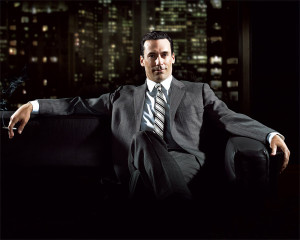The popularity of the anti-hero (man or woman) continues to be a strong trend in literature and in pop culture. With their moral complexity, they seem more realistic because of their human frailties. They are far from perfect. They tend to question authority and they definitely make their own rules, allowing us all to step into their world and vicariously imagine how empowering that might feel.
Some classic literary anti-heroes that are personal favorites of mine are:
Holden Caulfield in the Catcher in the Rye by J. D. Salinger, Roland Deschain in Stephen King’s Dark Tower series, Lestat in Anne Rice’s Interview with a Vampire, Hannibal Lecter (as Clarice’s white knight) in Thomas Harris’s Silence of the Lambs, Heathcliff in Emily Bronte’s Wuthering Heights, and even Scarlett O’Hara in Margaret Mitchell’s Gone with the Wind.
And here is a short list of noteworthy anti-heroes from the small screen:
On the TV show, HOUSE, Dr. Greg House is addicted to pain meds, a by-product of his damaged leg. He’s also obnoxious, abrasive, brutally honest, and definitely politically incorrect in how he deals with patients, but he’s damned good at what he does—saving lives. His public face appears to be a detached man who ridicules any real human emotion, yet he’s fascinated by true emotion too. It’s as if he’s an outsider looking in, an observer of the whole human experience. We never quite know if he really cares about his patients or is merely obsessed with being right as he puzzles out the reasons for the illnesses.
On the cable show, DEXTER, the strange anti-hero, Dexter Morgan, is a serial killer with a goal. He hunts serial killers and satisfies his blood lust by killing them. He’s got peculiar values and loyalties with a dark sense of humor. And he’s absolutely fascinating to watch.
On the new show HUMAN TARGET, Christopher Chance has a dark history. He’s a do-it-all anti-hero, former assassin turned bodyguard, who is a security expert and a protector for hire. He works with an unusual and diverse team. His business partner, Winston, is a straight and narrow, good guy while his dark friend, Guerrero, is a man who isn’t burdened by ethics or morality. Each of these men has very different feelings about what it takes to get the job done, but they’ve found common ground to work together. And their differences make for a fun character study. (My favorite character is Guerrero and I wish his character had more airtime.)
I’ve put together a list of writing tips that can add depth to your villain or make your anti-hero/heroine more sympathetic, but let me know if you have other tried and true methods. I’d love to hear them.
1.) Cut the reader some slack by clueing them in early. Your Anti-Hero/Heroine has a very good reason for being the way they are.
2.) Make them human. Give them a code to live by and/or loyalties the reader can understand and empathize with.
3.) Make them sympathetic by giving them a pet or a soft spot for a child. Write the darkest character and match them up with something soft and you’ve got a winning combination that a reader may find endearing.
4.) Show the admiration or respect others have for them.
5.) Give your villain and anti-hero similar motivations for doing what they do. Maybe both of them are trying to protect their family, even though they’re on opposing sides.
6.) Give your villain or anti-hero a shot at redemption. What choice would they make?
7.) Understand your villain’s backstory. It’s just as important as your protagonist’s.
8.) Pepper in a backstory that makes your anti-hero vulnerable.
9.) Give them a weakness. Force them to battle with their deepest fears.
10.) Have them see life through personal experiences that we can only imagine but they have lived through. They must be much more vulnerable than they are cynical to deserve the kind of significant other that it takes to open them up to love.
11.) Make them real. To be real, they must have honest emotions.
If you have favorite anti-heroes you’d love to share, I would love to hear from you. And tell us why you like them so much. I’d also like to know if you have any other writer tips to share on creating anti-heroes. Creating them can be a challenge worth taking. Editors sure seem to love them too.


